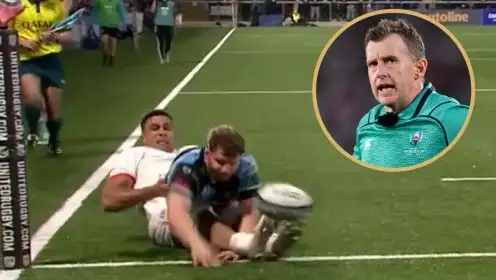Nigel Owens in agreement with South Africans as ex-referee bemoans World Rugby’s scrum proposal

Nigel Owens the former Test match referee.
Former Test referee Nigel Owens has voiced his concern that World Rugby risk “depowering” the scrum with their latest law proposals.
The governing body have revealed a series of ideas that will be voted on in May, including removing the ‘Dupont Law’ loophole and getting rid of the ‘croc roll’.
There could also be a global trial of the controversial 20-minute red card, while there is a plan to stop teams from taking a scrum after winning a free-kick from that set-piece.
South African anger
Understandably, South Africans are outraged, given that it could negate the threat of one of their biggest weapons, and Owens is in agreement.
“One of the interesting suggestions for a law to change is getting rid of the option to take another scrum from a free-kick awarded after a scrum,” he wrote in his WalesOnline column.
“We don’t want scrums to be the most important part of the game. The last thing we want is just a series of collapsed scrums and resets.
“But rugby union is a game for all shapes and sizes, so it’s important the scrum remains a weapon for teams who are good at it. I feel they’re just depowering the scrum at the moment.
“You don’t see any more five-metre scrums because of the goal-line dropout and then you could have this as well. The scrum could be a non-entity in the game and then you’d just be sitting down to watch rugby league.
“I agree we need to address the issues at the scrum, but depowering them isn’t the issue. What will guys like Uini Atonio do then?
‘A farce’ – World Rugby slammed following law proposal that could negate Springboks’ main weapon
Owens is also worried that it could lead to some gamesmanship from teams who have weaker scrums.
“I just wonder if it’ll encourage a side, and I think this might have happened already in some games, who are weaker in the scrum to not take the hit and then it looks like the dominant side is pushing early, so they concede a free-kick,” he added.
“If you’re under pressure at the scrum, and you know the opposition won’t be able to take the scrum from a free-kick, then you’ll try to play for the free-kick.”
Meddling with the sport
While rugby should always strive to improve the product, Owens doesn’t quite understand why World Rugby is constantly tinkering with the laws.
“Sometimes, it feels like no other sport meddles with the laws as much as we do in rugby union,” the Welshman wrote.
“Football is a very successful and enjoyable game for many years and it hasn’t tinkered with the rules too much over the years. Of course, they’ve followed our lead with video technology but it’s hard to remember any huge changes since the back-pass rule in 1992.
“The handball rule has been tweaked at times, but football by and large remains the same sport.
“Now, rugby has had to change at times because of safety as it’s a much more physical contact sport. But when you’re tinkering with laws all the time, it’s difficult to help it grow.
“When you look at the France vs England game last Saturday, which was a brilliant game, the laws are the exact same as any other game of rugby – including some which haven’t been so good.
The issue, as Owens sees it, is the laws not being applied properly and that the officials simply need to be stricter.
“It’s not the laws that are so much the issue. They are all there but they have to be applied. And, looking through the five-phase approach by World Rugby, many of the fixes probably already exist,” he added.
“As I’ve said in previous columns, a lot of the stuff which will help the game is already in the laws. It just needs to be refereed more stringently. In fairness, that’s the first part of World Rugby’s plan – acting on some existing laws more consistently.”
READ MORE: World Rugby reveal plans to depower scrums and close ‘Dupont Law’ loophole


